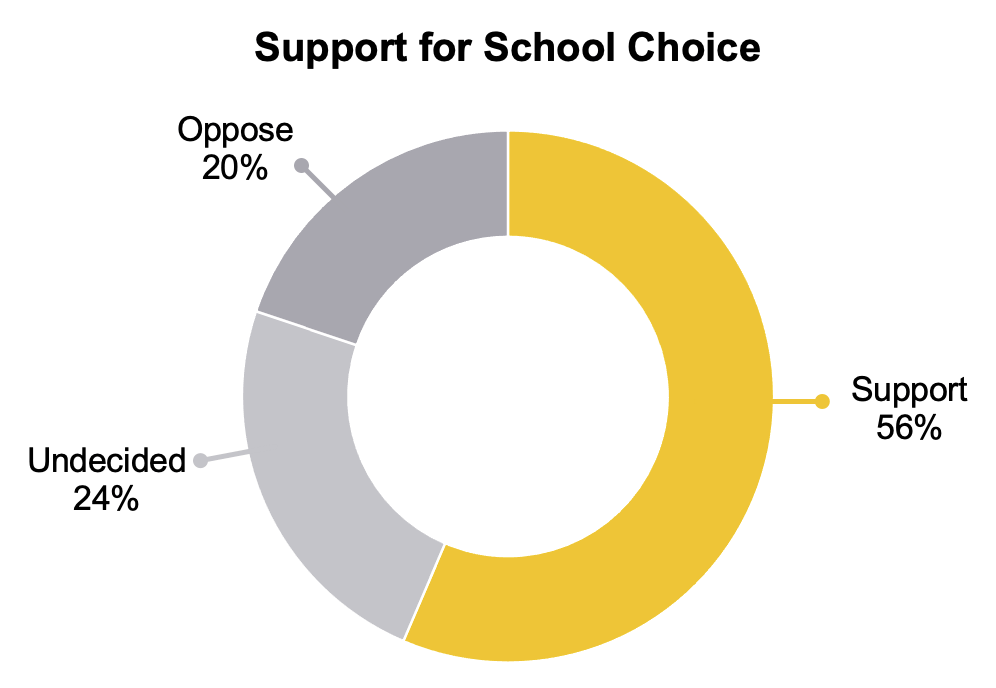School choice is no longer a fringe idea-it’s a defining issue capturing the attention of American parents and lawmakers alike. Recent legislation passed and signed into law in states like South Carolina, Texas, and Indiana exemplifies a powerful trend: parents demanding control over their children’s education. This surge reflects a growing national consensus that education should be as unique as each child, and that parents deserve the freedom to choose the best learning environment for their families.
Most Americans Agree on School Choice
Data from Heart+Mind’s latest national survey taken in April 2025 reveals that 57% of Americans support school choice, meaning they want their tax dollars to follow their children to the educational setting that fits best. Whether that’s a private, parochial, online, public, charter, or homeschool option, parents want options–not mandates. Opposition is minimal: only 20% of Americans oppose school choice, and just 10% strongly oppose it. Another 24% of Americans remain undecided.

School choice enjoys broad-based support across all demographic groups. It’s not confined to one gender, age group, income bracket, or educational background. No subgroup in the survey showed more than 35% opposition to the idea of taxpayer-funded school choice programs. Politically, the issue bridges party divides: 70% of Republicans, 56% of Independents, and even 47% of Democrats back school choice. This rare bipartisan appeal signals an opportunity for elected officials to work together to support parents.
SC, TX, and IN Latest Converts to School Choice
South Carolina, Texas, and Indiana recently enacted laws creating more school choice options, reflecting this widespread parental demand. These laws enable families to access public funds for private and alternative schooling, empowering parents to tailor education to their children’s needs rather than being limited by geography or district policies. These states are part of a growing wave–32 states, plus Washington, D.C., now offer some form of school choice, with new programs accelerating in recent years.
- For Texas, Governor Abbott signed Senate Bill 2 into law on May 3, 2025, creating the largest school choice program in the U.S. to date, allowing most Texas students to receive up to $10,000 a year for private school tuition, with additional support for students with disabilities. The program is funded with $1 billion for the first two years and is set to begin September 1, 2025.
- For South Carolina, the House and Senate passed universal school choice legislation (Education Scholarship Trust Fund), with phased eligibility based on family income and enrollment caps, aiming for universal access by the 2027–28 school year. The program provides scholarships funded from both lottery and general funds, with oversight to ensure compliance and prevent conflicts of interest.
- Indiana’s Governor Mike Braun signed a budget that expands the state’s school voucher program by removing family income requirements. Indiana lawmakers are also granting the state’s charter schools full access to local property taxes for funding, paving the way to allow tax dollars to follow students to whichever school they choose by 2029.

Why Now?
Why does school choice resonate so strongly right now? The pandemic exposed cracks in traditional public schooling, with closures and remote learning sparking dissatisfaction. Parents saw firsthand the limitations of one-size-fits-all education and sought alternatives. This urgency accelerated school choice expansion and enrollment growth in private and charter schools. Parents want agency, accountability, safety, and quality–school choice delivers on all four.
Critics worry about funding shifts and equity, but the data suggests school choice programs can coexist with strong public schools. Studies by EdChoice demonstrate that funding for public schools does not go down with new school choice options. By allowing funds to follow students, competition also encourages all schools to improve. Most importantly, school choice honors the fundamental right of parents to decide what’s best for their children’s education–a principle that transcends politics.
RELATED: Bridging the Gap – New Insights on Higher Education and Workforce Development
School Choice Unites Us
Most Americans want to give parents the freedom to make the right choice for their children’s education. This goes beyond partisanship and politics as usual. It taps into shared values: parental empowerment, educational excellence, fairness, and an aspiration for a better future. By emphasizing choice, opportunity, and respect for all families, school choice can bridge divides, build consensus, and provide better educational opportunities for our children. As South Carolina, Texas, and Indiana show, when parents lead the conversation, education policy reflects the diverse needs of American families.
Survey Methodology: The survey consisted of 1,000 online interviews conducted April 1-11, 2025. Respondents for this survey were selected from among those who have volunteered to participate in online surveys and polls.
The data (approximately 1000 respondents) is gathered from of one of the largest online panels, which attempts to approximate a cross-section of the US population. To ensure representation of a wide variety of demographic groups we impose quotas by age, gender, and ethnicity based on US Census data for people aged 18 and older.
